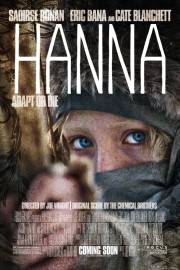Hanna
To all of those who have not helped “Hanna” become the sleeper blockbuster it deserves to be, I have a few words: There is still time. True, “Fast Five” is out now, too, and it is blowing the lid off of the drab box-office of 2011 thus far, but my advice is to seek out “Hanna” before it leaves theaters and, if not then, at least when it hits DVD/Blu-Ray, so you can see why the film has a real shot at being a dark horse Best Picture nominee come Oscar time. Yes, you read that right; and yes, even with 10 nominees the Academy can still screw the pooch, but with strong endorsements by critics and limited Oscar potential on the horizon, this is a film worthy of making a splash.
Since coming on the scene with his 2005 adaptation of “Pride & Prejudice,” director Joe Wright has become a filmmaker to be reckoned with. He followed that film up with the multiple Oscar nominee “Atonement” (which garnered himself a Best Director nod) and then 2009’s “The Soloist” (an underrated film with strong performances that got lost come Oscar time). Never making the same movie twice, Wright has made a complete left turn from those “Oscar bait” films and delivered a great little thriller that is not only a primal piece of excitement but also profoundly cerebral and emotional. Like the best thrillers, it is what is underneath the surface that gets at us and allows us to feel sufficiently “thrilled” by what we are watching. Hollywood may not be getting rich so far in 2011, but they have delivered an embarrassment of riches to moviewatchers who look beyond the hits to find diamonds in the rough (see “Source Code,” “The Adjustment Bureau,” and “Insidious” for other thrillers that genuinely thrill). “Hanna,” driven by a rough visual style and a mesmerizing score by The Chemical Brothers, sparkles brightest of all.
A big part of the film’s success falls on Saoirse Ronan, the young talent Wright himself introduced to audiences in “Atonement” (for which she earned an Oscar nomination). Since then she has made equally vivid impressions in Peter Jackson’s “The Lovely Bones” and Peter Weir’s “The Way Back.” In reuiniting with Wright, however, Ronan finds a role that should bring her real notoriety as Hanna, a young woman raised by her father, Erik Heller (Eric Bana), in the forests of Finland since her mother died when she was a baby. Over the years Erik has taught his daughter survival skills and hand-to-hand combat maneuvers as a means of self-preservation; the first thing we see is Hanna hunting and killing a deer for food. Bana is sensational as a father who attempts to shield Hanna from the outside world while also preparing her for the harsh realities of it; his final words to her before he lets her go on her own are “adapt or die.” That sage advice will come in handy as Hanna makes herself known to the world, and an old enemy of her father’s, Marissa Weigler (Cate Blanchett, in her finest work in years), comes after her. That is when Hanna, both the film and the character, really kick into high gear.
The screenplay by David Farr and Seth Lochhead has a great many twists and turns that change the nature of the story and the characters. There are times when the film resembles a Bond film, such as Hanna’s escape from an underground CIA base; other times when it plays like the story of a young woman coming of age, such as when Hanna meets and befriends a British family with a sassy daughter (Jessica Barden); and yet other times when it becomes a perverse modern fairy tale, with Marissa as the evil stepmother and Hanna as the young princess who has to show her independence. The difference is that no Prince Charming is coming to save Hanna; even a late reunion with her father is one of tragedy as Hanna now posesses knowledge that questions the only bond she has ever known. Hanna finds herself alone in a scary world she does not understand, like something out of the Brothers Grimm. But Wright does not take pleasure in his young protagonist’s pain, nor does he exploit it for cheap thrills; just as in a fairy tale, good and bad are very clearly defined, and it is only through adaptation and emotional courage that Hanna is able to follow her heart to know what is right and wrong in this sometimes sick world.
Watching “Hanna” was like a throwback to when action movies were, you know, ABOUT something. Think back to the first two “Lethal Weapon” films. Or “The Long Kiss Goodnight.” Or “Rambo: First Blood.” Or “The French Connection.” Or John Woo’s Hong Kong films. What all of these films have in common is a story that not only plays with the conventions of the genre but also gives us characters to care about and action sequences that are less driven by effects and more driven by the story and the character’s desires. True, they do not stray far from the beaten path, but they are not afraid to go off on their own, either.










